| Srl | Item |
| 1 |
ID:
138794
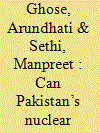

|
|
|
|
|
| Summary/Abstract |
Mark Fitzpatrick, a non-proliferation analyst at the International Institute for Strategic Studies (IISS) in London, is among the latest to hazard solutions to Pakistan’s nuclear dangers and myriad other problems. In his Adelphi book, Overcoming Pakistan’s Nuclear Dangers, he identifies four specific dangers presented by Pakistan’s nuclear programme: the potential for
nuclear use; for a nuclear arms race; for nuclear terrorism; and for onward proliferation and nuclear accidents. After an assessment of each danger, he proffers three recommendations, among them the ‘nuclear normalisation’ of Pakistan, defined as offering the country a nuclear-cooperation deal ‘akin to’ the one given to India in 2008.
|
|
|
|
|
|
|
|
|
|
|
|
|
|
|
|
| 2 |
ID:
150335
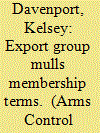

|
|
|
|
|
| Summary/Abstract |
The Nuclear Suppliers Group (NSG) is considering a set of draft criteria to guide membership applications from states that are not party to the nuclear Nonproliferation Treaty (NPT), according to a document obtained by Arms Control Today in December.
|
|
|
|
|
|
|
|
|
|
|
|
|
|
|
|
| 3 |
ID:
157823


|
|
|
|
|
| Summary/Abstract |
The Nuclear Suppliers Group (NSG) has been beset with its relationship with India ever since New Delhi and Washington in 2005 announced that they would strike up a bilateral partnership requiring that the NSG lift longstanding restrictions aimed at blunting India’s nuclear development. India’s history of hostility to the very mission of the NSG has prompted questions and even suspicion about India’s reasons for wanting to join the arrangement. These concerns continue to affect NSG members’ views about the terms under which India might become a participant; to date India has not been admitted into the group. While India has not openly articulated an elaborate official catalog of its reasons, Indian participants and observers have provided several partial explanations for India’s strong desire for NSG membership. Their statements suggest that a number of specific Indian interests concerning India’s nuclear-energy program would be advanced by NSG participation, but also that India’s ultima ratio is its quest for greater international political status. A historical approach to the case also permits the conclusion that India applied for NSG membership following an evolution in New Delhi’s perceptions of its security threats as well as of the strategic significance of its nuclear-energy program.
|
|
|
|
|
|
|
|
|
|
|
|
|
|
|
|
| 4 |
ID:
152424
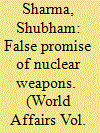

|
|
|
|
|
| Summary/Abstract |
Shubham Sharma argues that the nuclearisation of South Asia has deprived India of its territorial, demographic and conventional edge over Pakistan. Moreover, through the Nuclear Deal with the US, India has sacrificed some of its strategic autonomy while remaining vulnerable to Pakistani and Chinese hostility. On balance the pursuit of a nuclear deterrent has brought more losses than gains.
|
|
|
|
|
|
|
|
|
|
|
|
|
|
|
|
| 5 |
ID:
094518
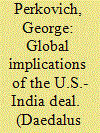

|
|
|
| 6 |
ID:
085200
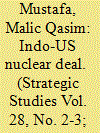

|
|
|
| 7 |
ID:
095276
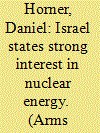

|
|
|
|
|
| Publication |
2010.
|
| Summary/Abstract |
Israel's infrastructure minister last month strongly reaffirmed his country's interest in pursuing a nuclear power program and suggested such a program could be "an area for regional cooperation."
|
|
|
|
|
|
|
|
|
|
|
|
|
|
|
|
| 8 |
ID:
193522
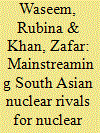

|
|
|
|
|
| Summary/Abstract |
There is a need for mainstreaming South Asian Non-NPT Nuclear Weapon States. India is an emerging market and Pakistan has the potential to become a future market for nuclear energy. Furthermore, they have nuclear weapons, making it important to take them on board in the Nuclear Nonproliferation Regime (NPR). Given the reality that they are not ready to roll back their nuclear program, there is a need to explore options for mainstreaming them especially in nuclear export control mechanisms. This article investigates the policy imperatives for the international community to address the South Asian Non-NPT-NWSs in the NSG.
|
|
|
|
|
|
|
|
|
|
|
|
|
|
|
|
| 9 |
ID:
013306
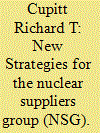

|
|
|
|
|
| Publication |
July-Sept 1997.
|
| Description |
305-15
|
|
|
|
|
|
|
|
|
|
|
|
|
|
|
|
| 10 |
ID:
115301
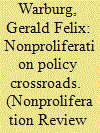

|
|
|
|
|
| Publication |
2012.
|
| Summary/Abstract |
On October 1, 2008, Congress enacted a proposal that originated with President George W. Bush in 2005 to approve an unprecedented nuclear trade pact with India by removing a central pillar of US nonproliferation policy. Despite the numerous political challenges confronting the Bush administration, the initiative won strong bipartisan support, including votes from Democratic Senators Joseph Biden, Hillary Clinton, and Barack Obama. The four-year struggle to pass the controversial US-India nuclear trade agreement offers an exceptionally valuable case study. It demonstrates a classic tradeoff between the pursuit of broad multilateral goals such as nuclear nonproliferation and advancement of a specific bilateral relationship. It reveals enduring fault lines in executive branch relations with Congress. It vividly portrays challenges confronting proponents of a strong nonproliferation regime. This article is based on an analysis of the negotiating record and congressional deliberations, including interviews with key participants. It assesses the lessons learned and focuses on three principal questions: how did the agreement seek to advance US national security interests?; what were the essential elements of the prolonged state-of-the-art lobbying campaign to win approval from skeptics in Congress?; and what are the agreement's actual benefits-and costs-to future US nonproliferation efforts?
|
|
|
|
|
|
|
|
|
|
|
|
|
|
|
|
| 11 |
ID:
115751
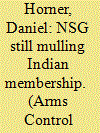

|
|
|
| 12 |
ID:
123691
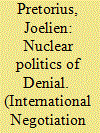

|
|
|
|
|
| Publication |
2013.
|
| Summary/Abstract |
AbstractSouth Africa was one of the first states to conclude an Additional Protocol with the International Atomic Energy Agency (IAEA) in 2002, allowing the IAEA greater right of access to safeguard nuclear activities and material. In light of this, some observers in the arms control community find it odd that South Africa's representatives at the Nuclear Suppliers Group (NSG) would be the main objectors to making the conclusion of an Additional Protocol a precondition for states wishing to import uranium enrichment and reprocessing technology (classified as sensitive nuclear technology and material). The South African objection should be viewed as only the most recent in a series of objections to measures that may seem obviously in line with nuclear non-proliferation. This emerging pattern in South Africa's nuclear diplomacy and, more specifically, the objection to the Additional Protocol condition are related to its membership in the Non-Aligned Movement (NAM) and can be investigated through the lens of a politics of denial. Denial is the act of saying "no", but it is also in psychological parlance the unconscious thought process manifesting a refusal to acknowledge the existence of certain unpleasant aspects of external reality. It will be argued that South Africa's opposition to the Additional Protocol condition can be explained in the context of two instances of denial: (i) a perceived denial by the nuclear haves of what the Nuclear Non-Proliferation Treaty codifies as an inalienable right to peaceful nuclear technology - something that South Africa is cautious to be complicit in; and (ii) the nuclear weapon states' denial (the psychological meaning) of the unpleasant reality of a hypocritical nuclear order - something that South Africa wants to expose or at least something with which to engage to limit the effects for itself and other NAM members. The politics of denial does not yield to a pragmatist/utopian dichotomy in the nuclear realm, but instead reveals the dialectic nature of realism and idealism in nuclear politics, especially as reflected in South Africa's nuclear diplomacy.
|
|
|
|
|
|
|
|
|
|
|
|
|
|
|
|
| 13 |
ID:
111983
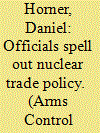

|
|
|
| 14 |
ID:
107359
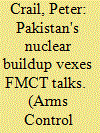

|
|
|
| 15 |
ID:
148113
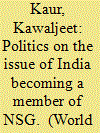

|
|
|
|
|
| Summary/Abstract |
Recently there was much flurry both in the media as well as in the corridors of power in New Delhi regarding India’s bid for the membership of the Nuclear Suppliers Group which was holding a plenary session in Seoul (South Korea).The Prime Minister Narindra Modi, himself led the endeavour by reaching out to different countries to obtain for India ‘the global acceptance as a legitimate nuclear power’ which would enable New Delhi to import nuclear technology and fuel from international market more conveniently. With the explicit backing of the USA, as in the successful attempt of President Bush in 2008 getting a special waiver for India from NSG to do trade in nuclear technology for peaceful purposes, India hoped to achieve a déjà vu by getting a membership of the elite group itself.
|
|
|
|
|
|
|
|
|
|
|
|
|
|
|
|
| 16 |
ID:
089491
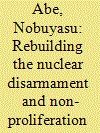

|
|
|
|
|
| Publication |
2009.
|
| Summary/Abstract |
The US-India deal on civil nuclear cooperation, in spite of the Indian non-proliferation commitment, has potential adverse impacts on global non-proliferation undermining the basic bargain behind the NPT. In order to overcome such adverse impacts the author proposes to move towards a "universal nuclear disarmament" under which every nuclear weapon holder will be asked to make contributions towards nuclear disarmament. The US, for example, will be asked to ratify CTBT, negotiate a successor to the START I Treaty and engage in strategic dialogues with Russia and China.
The author proposes to apply a proportionate reduction of nuclear warheads weighted according to the size of each arsenal. This way, while the US and Russia will be asked to drastically reduce their arsenals, the other holders will also be asked to start reducing their warheads even in a symbolic manner of by just a few bombs each.
|
|
|
|
|
|
|
|
|
|
|
|
|
|
|
|
| 17 |
ID:
101794
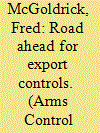

|
|
|
| 18 |
ID:
138544
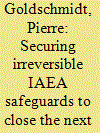

|
|
|
|
|
| Summary/Abstract |
Over time, states have endeavored to improve the effectiveness of the international nonproliferation regime. These efforts have included the adoption by the International Atomic Energy Agency (IAEA) of the Model Additional Protocol to comprehensive safeguards agreements, the tightening by the Nuclear Suppliers Group (NSG) of export criteria on sensitive nuclear fuel-cycle technology, and the adoption of UN Security Council Resolutions 1540 and 1887.
|
|
|
|
|
|
|
|
|
|
|
|
|
|
|
|
| 19 |
ID:
115799
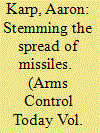

|
|
|
| 20 |
ID:
090637
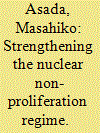

|
|
|
|
|
| Publication |
2009.
|
| Summary/Abstract |
Since around the turn of the century, the Nuclear Non-Proliferation Treaty (NPT) has suffered fundamental challenges from several quarters, which has led to a number of proposals to reinforce the non-proliferation regime. Among the most effective are a ban on sensitive nuclear transfers and the universalisation of the Additional Protocol. The former proposal, although not agreed upon in the NSG, has been virtually realised as a moratorium within the G-8 framework. It would be advisable for the G-8 to do the same with regard to the latter proposal.
|
|
|
|
|
|
|
|
|
|
|
|
|
|
|
|